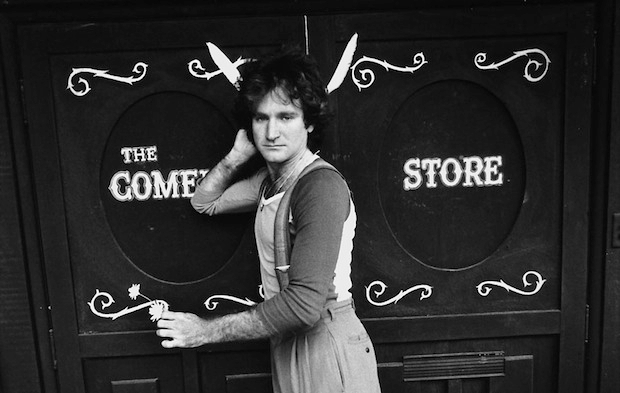In 2001 I wrote a book called The Comedy Store (still available in some good bookshops – and quite a lot of bad ones) about the London comedy club that kick-started modern British comedy. The book was a bit of a mixed bag, but the best bits were where I shut up and let these comics talk about each other. And the comic they talked about most of all was Robin Williams. Their tales of seeing him perform for the sheer love of it, in front a few hundred tipsy punters, show what a great comic we’ve all lost.
Robin Williams first played the Comedy Store in 1980, on a trip to London to dub the voice-over for Robert Altman’s Popeye. The compere that evening was Alexei Sayle. ‘He’d finished filming Popeye in Malta with Robert Altman that day, got on a plane to London, got in a cab and said, “Take me to a comedy club,’ Sayle told me. ‘Nobody knew him. We only knew him then from Mork & Mindy, which was on at ten o’clock on a Saturday morning, and always judged to be a kids’ show in this country.’ Williams had to buy a ticket. When he asked Sayle if he could do a spot, Sayle had no idea who he was. ‘An American just walked in and asked to go on,’ Sayle told Don Ward, the Store’s owner. This wasn’t so unusual. ‘Open spots’ were a Store speciality – though most of them died a horrid death. Ward told Sayle to give him five minutes. He did 40. ‘He absolutely stormed the place,’ said Ward. ‘He was like a whirlwind.’ He never had to buy another ticket.
Williams dropped in to play the Store numerous times thereafter. The club didn’t pay him to appear, but they always made him a cup of tea. Until Good Morning Vietnam (released in 1988) he wasn’t really a household name, so it wasn’t his fame that brought the house down. He really was that good, and completely different from all the rest. Most Store comics keep it tight, banging out quickfire punchlines to guard against drunken hecklers. With his vast array of comic characters, Williams was entirely free-form, more like a jazz musician than a comedian. Some of his act was pre-prepared but a lot of it was improvised, and you couldn’t work out which was which. He was utterly unpredictable. You could never tell what he’d do next. ‘It was just amazing,’ said Don Ward’s right hand man, Kim Kinnie, who booked the acts. ‘We hadn’t seen people use an audience like that.’
‘He can make comedy out of anything,’ said Tim Clark, a regular comic at the Store who was on immediately before Williams one evening. ‘Some of the apparent spontaneity is contrived, but that’s a craft as well.’ Williams came off that night to a standing ovation, but instead of basking in the adulation he went straight over to Clark and said how much he’d enjoyed Clark’s set. And that wasn’t all. Plenty of star turns drain the laughter out of a room, leaving the other comics nothing to work with, but Williams was careful not to steal the show. ‘He was very professional,’ said Bill Bailey. ‘He gradually wound it down, until the last bit of material wasn’t even gags. He made sure he wouldn’t be impossible to follow.’ But he is, of course. RIP.
William Cook is the author of The Comedy Store – The Club That Changed British Comedy (Little, Brown)






Comments